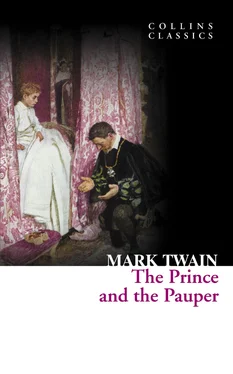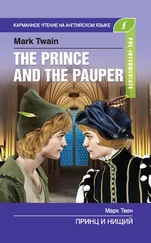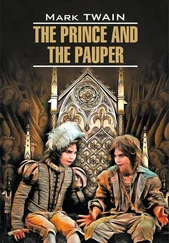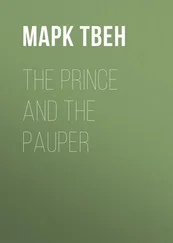THE PRINCE
AND THE PAUPER
Mark Twain

Harper Press
An imprint of HarperCollins Publishers 1 London Bridge Street London SE1 9GF
This edition published 2011
A catalogue record for this book is available from the
British Library
Life & Times section by Gerard Cheshire
Classic Literature: Words and Phrases adapted from
Collins English Dictionary
All rights reserved under International and Pan-American Copyright Conventions. By payment of the required fees, you have been granted the nonexclusive, nontransferable right to access and read the text of this e-book on-screen. No part of this text may be reproduced, transmitted, downloaded, decompiled, reverse engineered, or stored in or introduced into any information storage and retrieval system, in any form or by any means, whether electronic or mechanical, now known or hereinafter invented, without the express written permission of HarperCollins.
HarperCollinsPublishers has made every reasonable effort to ensure that any picture content and written content in this ebook has been included or removed in accordance with the contractual and technological constraints in operation at the time of publication.
Source ISBN: 9780008156152
Ebook edition © MAY 2012 ISBN 9780007477470
Version: 2020-11-18
Cover
Title Page
Copyright
Chapter 1 The Birth of the Prince and the Pauper
Chapter 2 Tom’s Early Life
Chapter 3 Tom’s Meeting with the Prince
Chapter 4 The Prince’s Troubles Begin
Chapter 5 Tom as a Patrician
Chapter 6 Tom Receives Instructions
Chapter 7 Tom’s First Royal Dinner
Chapter 8 The Question of the Seal
Chapter 9 The River Pageant
Chapter 10 The Prince in the Toils
Chapter 11 At Guildhall
Chapter 12 The Prince and His Deliverer
Chapter 13 The Disappearance of the Prince
Chapter 14 “Le Roi Est Mort—Vive Le Roi”
Chapter 15 Tom as King
Chapter 16 The State Dinner
Chapter 17 Foo-foo the First
Chapter 18 The Prince with the Tramps
Chapter 19 The Prince with the Peasants
Chapter 20 The Prince and the Hermit
Chapter 21 Hendon to the Rescue
Chapter 22 A Victim of Treachery
Chapter 23 The Prince a Prisoner
Chapter 24 The Escape
Chapter 25 Hendon Hall
Chapter 26 Disowned
Chapter 27 In Prison
Chapter 28 The Sacrifice
Chapter 29 To London
Chapter 30 Tom’s Progress
Chapter 31 The Recognition Procession
Chapter 32 Coronation Day
Chapter 33 Edward as King
Chapter 34 Conclusion: Justice and Retribution
Classic Literature: Words and Phrases Adapted from the Collins English Dictionary
About the Author
History of Collins
About the Publisher
CHAPTER 1 The Birth of the Prince and the Pauper
In the ancient city of London, on a certain autumn day in the second quarter of the sixteenth century, a boy was born to a poor family of the name of Canty, who did not want him. On the same day another English child was born to a rich family of the name of Tudor, who did want him. All England wanted him too. England had so longed for him, and hoped for him, and prayed God for him, that now that he was really come, the people went nearly mad for joy. Mere acquaintances hugged and kissed each other and cried. Everybody took a holiday, and high and low, rich and poor, feasted and danced and sang, and got very mellow; and they kept this up for days and nights together. By day, London was a sight to see, with gay banners waving from every balcony and housetop, and splendid pageants marching along. By night, it was again a sight to see, with its great bonfires at every corner, and its troops of revelers making merry around them. There was no talk in all England but of the new baby, Edward Tudor, Prince of Wales, who lay lapped in silks and satins, unconscious of all this fuss, and not knowing that great lords and ladies were tending him and watching over him—and not caring, either. But there was no talk about the other baby, Tom Canty, lapped in his poor rags, except among the family of paupers whom he had just come to trouble with his presence.
CHAPTER 2 Tom’s Early Life
Let us skip a number of years.
London was fifteen hundred years old, and was a great town—for that day. It had a hundred thousand inhabitants—some think double as many. The streets were very narrow, and crooked, and dirty, especially in the part where Tom Canty lived, which was not far from London Bridge. The houses were of wood, with the second story projecting over the first, and the third sticking its elbows out beyond the second. The higher the houses grew, the broader they grew. They were skeletons of strong crisscross beams, with solid material between, coated with plaster. The beams were painted red or blue or black, according to the owner’s taste, and this gave the houses a very picturesque look. The windows were small, glazed with little diamond-shaped panes, and they opened outward, on hinges, like doors.
The house which Tom’s father lived in was up a foul little pocket called Offal Court, out of Pudding Lane. It was small, decayed, and rickety, but it was packed full of wretchedly poor families. Canty’s tribe occupied a room on the third floor. The mother and father had a sort of bedstead in the corner; but Tom, his grandmother, and his two sisters, Bet and Nan, were not restricted—they had all the floor to themselves, and might sleep where they chose. There were the remains of a blanket or two, and some bundles of ancient and dirty straw, but these could not rightly be called beds, for they were not organized; they were kicked into a general pile mornings, and selections made from the mass at night, for service.
Bet and Nan were fifteen years old—twins. They were good-hearted girls, unclean, clothed in rags, and profoundly ignorant. Their mother was like them. But the father and the grandmother were a couple of fiends. They got drunk whenever they could; then they fought each other or anybody else who came in the way; they cursed and swore always, drunk or sober; John Canty was a thief, and his mother a beggar. They made beggars of the children, but failed to make thieves of them. Among, but not of, the dreadful rabble that inhabited the house, was a good old priest whom the king had turned out of house and home with a pension of a few farthings, and he used to get the children aside and teach them right ways secretly. Father Andrew also taught Tom a little Latin, and how to read and write; and would have done the same with the girls, but they were afraid of the jeers of their friends, who could not have endured such a queer accomplishment in them.
All Offal Court was just such another hive as Canty’s house. Drunkenness, riot, and brawling were the order there, every night and nearly all night long. Broken heads were as common as hunger in that place. Yet little Tom was not unhappy. He had a hard time of it, but did not know it. It was the sort of time that all the Offal Court boys had, therefore he supposed it was the correct and comfortable thing. When he came home empty-handed at night, he knew his father would curse him and thrash him first, and that when he was done the awful grandmother would do it all over again and improve on it; and that away in the night his starving mother would slip to him stealthily with any miserable scrap or crust she had been able to save for him by going hungry herself, notwithstanding she was often caught in that sort of treason and soundly beaten for it by her husband.
Читать дальше













